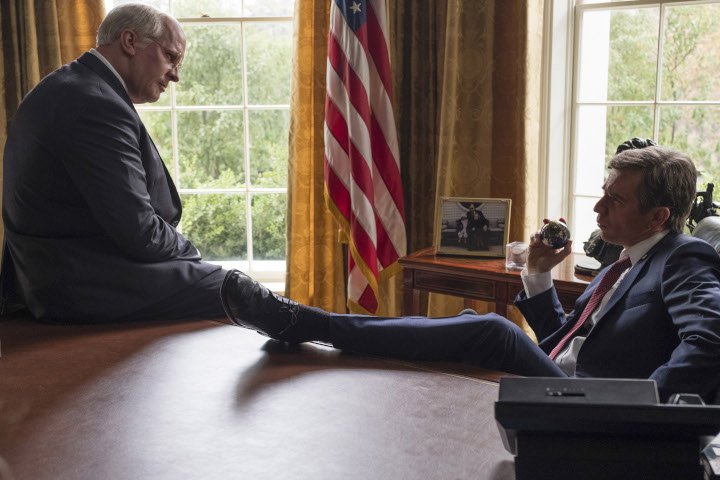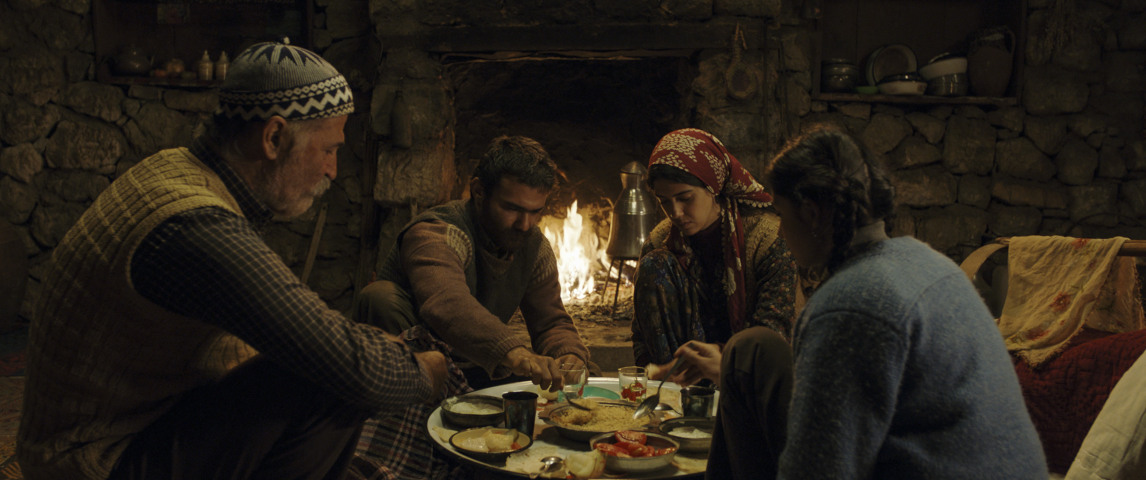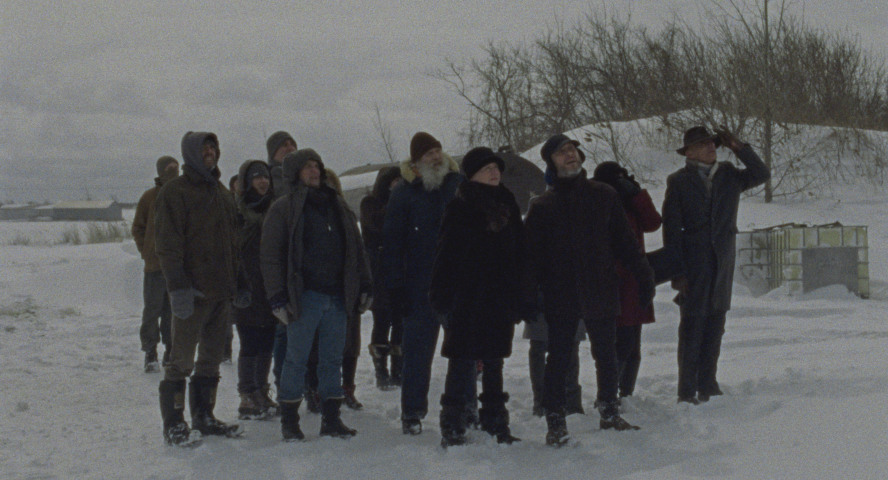(Berlin.) The best words to describe Denis Côté’s Ghost Town Anthology appear in the film itself: “You don’t need to be scared! Sometimes, I don’t understand either, what is going on.” ‘And I often bore people’, the director could have added.
Répertoire des Villes Disparues starts like just another “eccentrics in the ice desert” arthouse comedy set in Quebec, but it later changes into... well, something else, that nobody in his right mind could call “horror”.
Modernity has already arrived in form of a mayoress (first time I’ve ever heard the newspeak “mairesse” au lieu de “Mme la maire”), and Montréal authorities send an Arab woman to counsel villagers after the suicide of a young man. Family, friends, and neighbours all have different ways to cope with the tragedy. M. Côté is a Canadian director, touched by European high culture and North American knowhow alike. Obviously a fan of George Romero (and maybe 30 Days of Night), he desperately wants to do Film, but he loves himself a good movie too. Thus, the story changes: The dead come back life – is this indeed meant to be horror? There’s no thrill whatsoever, a handful of jump scares: yes, but otherwise nothing even remotely scaring. We quickly learn, these hybrids of zombies and ghosts won’t bite or harm you in any other way. They just like to hang out with the living for a while, they have nothing better to do than standing on your front lawn and stare holes in the air. (Some of the group scenes let me assume, Côté has watched – and liked – the 2003 French (-Canadian?) flic Dead End, which is quite good.) I see dead people, frozen in boredom.
The standing dead will get along just fine with the living. Maybe it’s meant for a metaphor, to show what life in icy Quebec is like, frozen in space and time, but frost and death will preserve it for eternity. What will happen when it thaws – will it ever thaw again?! There are no Eskimos to be found among the deadheads, by the way.
WArts Verdict: during the ∼90 minutes, it frequently changed between “merdique” and “pas si mal”. Much rather the first.
Richard Bruce “Dick” Cheney served as US president from 2001 to 2009, or so say some. Officially, he was only W’s Vice (president).
You’re in the mood for some agitprop, a two hours commercial for the US Democratic Party? Fine, then watch Adam McKay’s biography of Cheney, Vice.
The facts are sad and have been common knowledge ever since they took place: Cheney played a leading role part in the US administration that used 911 to start a war for resources in Iraq (actually one of the oldest motive for going to war) and like every mafia outlet enjoyed some solid kidnapping, torture, and killing on the side. It’s all well known, to everybody (well, almost everybody, with the exception of Tony Blair perhaps) but why show it again, today? And in such a way?
Vice is basically a comedy, all through the movie I kept wondering whether this was indeed Christian Bale in the lead role, and not Will Ferrell; facial expressions and gestures seem much more Ron Burgundy than Dick Cheney. - Imagine my surprise, when reading the end credits: Will Ferrell did coproduce this movie (I swear, I had no clue!). Sam Rockwell’s W. likewise appears as a caricature, but then again: W. always appeared like his own caricature.
Donald Rumsfeld on the other hand never was so likeable as in his portrayal by Steve Carell. Who’d not immediately vote, and love to work for, this guy?
Say what you want, but those guys wrote history (in blood, and still), their politics reshaped the world. There are details you might have forgotten, but once again: Vice teaches nothing new at all. It’s a more or less solid comedy, but completely fails in explaining, or only exploring, Cheney’s personality - Why did he become the man that acted the way he did? Apparently, he was just a psychopath without principles, who for no particular reasons liked to order torture, murder, and war. Is it really that easy?
Behind every successful man stands a strong woman, or how goes that saying? In Vice, Lynne Cheney is Lady Macbeth, this could be a new bit of information.
McKay uses the fucking millennials’ hell of a language (always get down with your demographics!), and accordingly keeps things very basic, from Nixon to Carter to Reagan, the Bushes, and Obama: Republicans baaad, Democrats gooood. (They carefully avoid any mention of Billy C., any ideas why? ... Could Monica indeed still damage Hillary’s second run for office?)
If life could only be black and white like this film.
Releasing Vice right now obviously is no coincidence, it’s not so much aimed at the past, at Bush and his crew, but against the current US president (who so far has never started a war, just for the record). It’s thus perfectly suited for a Berlin film festival - ask any random Germans about "Trump", and you’ll hear an outcry of indignation. Ninety-nine out of a hundred won’t be able though, to identify any specific law or political decision of his that they don’t agree with. Other than “that wall” of course. The same Germans by the way lock their doors every night because they don’t want any uninvited intruders in their home – no matter how poverty–driven those are. But a president putting “America first” (and thus Europe second, third, or whatever) doesn’t agree with that neglected Europe: The media is doing their work. It’s never about morals, it’s always about power.
WArts Verdict: I don’t like W. and his murderous gang. But I don’t like agitprop, either.
Ladies and gentlemen, we have another highlight!
Turkish director Emin Alper’s A Tale of Three Sisters tells a story without overtly lecturing us, without patronizing modern morals, but only: ‘This is, and I will tell you about it’.
It is a story of three sisters (yes I know, that doesn't come as a surprise) living with their father in a poor Anatolian village. They’ve all been sent for work as maids to the nearest city and come back for different reasons: The eldest got pregnant by an apprentice (or her boss?) and after her return married a halfwitted shepherd, the middle sister has beaten the bedwetting son of her employer who is a) a medical doctor playing an important part as the film unfolds, and b) is – probably – not identical with that elder sister’s former boss (or is he?!), and the youngest sister – well, I admit, I’ve had some trouble keeping track of details, which was partly due to the less than perfect subtitles that are typical for Berlinale (if you’re multilingual, compare the standard English and German subtitles once, maybe even in a film of which you understand the third, spoken, language. Or rather don’t) - but apparently, her employers have recently died in an accident. Regardless of those subtleties, the film is great. Honestly.
This is a society doomed to disappear soon. Emre Alper says, he’s already had troubles finding a suitable village for shooting it. The father, the village chief, the way, they deal with life, it’s a unique culture, and as such incompatible with modern life. Those girls need to become stauncher capitalists, er: “liberated” of course. On a meta-level, the film tells of diversity in the old version, a world of different colours, one here, one there, instead of pouring all into the same bucket in order to reach an equalized unity that is definitely more cost-effective.
Learned a thing today: Mortar is the rustic Turk’s glue, chew it, don’t sniff it.
Oh, and when that halfwit asks the doctor for a job at his brother’s petrol station, and gets the answer: “All you villagers imagine, you can just come to the city, without education, without experience, you cannot even read and write, and you expect, all delicacies will come flying into your mouth”, you’re not supposed to smile being a European.
WArts Verdict: Loved it. My kind of diversity, telling of a world where you could still travel and see something new instead of the same “values” and faces everywhere. Thanks for giving us this turkey, er: film (sorry, that was awkward). The cast is great, too.






Kommentarer